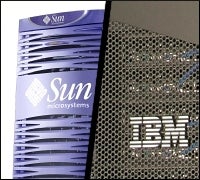 |
When word broke on Sunday that IBM (NYSE: IBM) had withdrawn its $7 billion offer for Sun Microsystems, many observers expected a collapse in Sun’s stock.
Instead, the result has industry analysts wondering if there’s a new deal in play for the embattled Silicon Valley pioneer.
Shares of Sun (NASDAQ: JAVA) opened the day down around 25 percent to $6.30, but its share price held steady throughout the day, hovering between $6.36 and $6.72.
“That stock should have cratered and stayed cratered,” industry analyst Rob Enderle of the Enderle Group told InternetNews.com.
More remarkable was how many shares changed hands. Based on the averages from the last three days, about 19 million Sun shares traded hands on a daily basis. But today, 92 million Sun shares traded hands, a four-fold-plus increase.
“The fact that it’s holding up and all these shares trading tells me they are in play,” Enderle added.
It’s not clear just who’s buying. “I haven’t seen any names popping up,” Brian Sozzi, research analyst for Wall Street Strategies told InternetNews.com. “If anything, I’d have to say IBM or maybe a Cisco is making a run.”
One possibility, observers say, is that it could be some persons or entities looking to get around ownership — which might have been a key obstacle to Sun’s closing a deal with IBM.
Numerous reports have pegged co-founder and chairman Scott McNealy as doing what Jerry Yang did to Yahoo’s offer from Microsoft — creating so much resistance that it scuttled the deal. With 14.5 million shares in his possession, according to the last annual Sun proxy statement, McNealy holds 2.3 percent of the company and a major controlling interest.
However, McNealy is not the largest shareholder. Southeastern Asset Management, an asset management fund, holds 17.3 percent of Sun shares. The company changed its status last October, indicating it would take a more active role in the firm. Thus far, it has been silent throughout the deal.
Southeastern Asset Management did not return calls from InternetNews.com seeking comment.
McNealy’s role
Reports after the merger’s breakup suggest that McNealy, who served as CEO of the company until 2006, had been behind the scuttling of the deal while Jonathan Schwartz, the current CEO, had wanted it.
The rumored reasons for McNealy’s resistance are as numerous as the leaks surrounding the deal: IBM wanted too much control; Sun wanted too much executive pay; IBM was going to tear Sun to shreds; there was a disagreement over the sale price.
Or McNealy could have held out for entirely different reasons.
“I think some of it, honestly, is ‘It’s my baby,'” said Clay Ryder, president of the Sageza Group. “It’s an emotional attachment than a financial/logical one. I’m not saying that to be critical of Scott. Sometimes, as a human being, we do things that don’t make sense, but we do them anyway.”
Page 2: Assessing Sun’s next moves
Page 2 of 2
But now, even if shareholders are angry at McNealy, he won’t be that easy to remove. Yang may be out as CEO of Yahoo, but he still has a role at the online pioneer. McNealy doesn’t have a CEO chair to be taken away, and there have been several attempts to oust him before, all of which have failed.
In addition to McNealy’s position, negotiations also could have been hurt by the constant leaks, Enderle said.
“It was clearly someone leaking who wanted the deal broken,” he said. “Whoever it was did a lot of damage. Most companies of IBM’s scale have a low tolerance of leaks and the amount of leaking would raise the bar for getting it done.”
Sun’s next steps
But now, the damage may done, Enderle said.
“This IBM deal aired too much laundry, and now folks know Sun might be sold for parts,” he said. “Sun’s ability to say to a customer, ‘We’re going to be here next year to support you,’ is a hard sell.
Worse, Sun may have alienated the only firm willing and able to swallow it whole. One might think that after the ignominious end for SGI last week, Sun wouldn’t be so quick to spurn a suitor.
Now, however, many see Sun’s future as ending up being sold off bit by bit.
“I think it would be a travesty in many respects if Sun becomes another SGI, and it would be a travesty if Sun becomes a collection of parts,” Ryder said.
For others, the best-case scenario sees IBM returning with another offer. No matter how low it is, Sun’s still better off selling, Sozzi said.
“I think they are going to lowball [Sun], and if they do, Sun still should take the deal,” he said. “If Sun hasn’t had a turnaround in this many years, I don’t see what they could do to cause a turnaround to justify the $9 and change [that] IBM are offering.”


